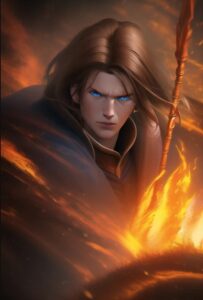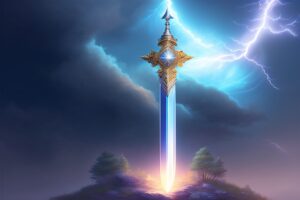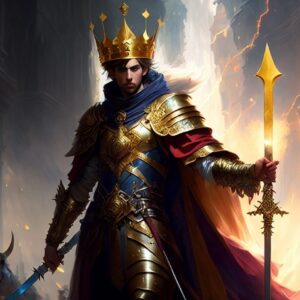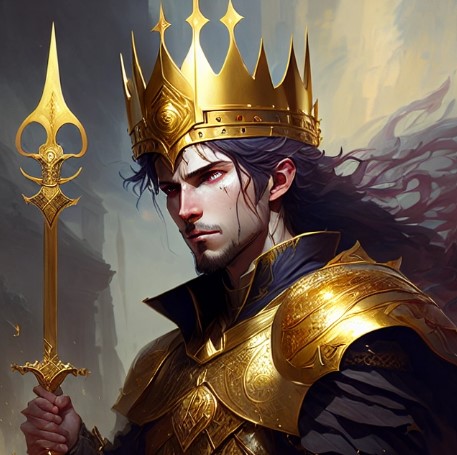Long ago in the time of legends, the disparate kings of the Sonaide Bri knew that the defenders at the Fortress of the High Reaches could keep the goblins at bay for only so long. Already the goblins, though beaten back, had found refuge in a series of tunnels and caverns beneath the mountains. They knew that in time, the goblins in time would dig a new passageway through the mountains.

And so the wizard Myogan, a powerful mage known as the Kestrel, bade all the kings of the Sonaide Bri to meet at midsummer at a great temple erected to the gods of the Áes Camáir, the gods worshipped by the Sonaide Bri.
They came, each of the disparate kings, with their household knights and foot soldiers. The temple, though an immense stone edifice, could hold but a fraction of each king’s retinue and but a few of the temple’s priests. Though built of blocks of stone, it was well lighted, for one each wall had a colorful window made of mosaic of cut colored glass soldered together with veins of lead. The mosaic on the window on the north wall depicted Ordae Ruíri, greatest of the gods, crowned in gold on his throne in Tír Tairngiri, his palace of white and gold leaf. On the east wall rode Airgdide Gérat, the Silver Knight, on his winged horse Lúamain and brandishing the blade Fáebar dé Gérat. On the south wall, the window depicted the goddess Gablán dé Brigga and her son, Imbas Dúil. And on the west wall appeared the goddess Bráenna ap Túirenn with the Croccán dé Túirenn.
“My Lord Kings, I have brought you together than we may discuss the goblin threat on our border,” Myogan began. “For though the mountains keep them at bay for the nonce, that will not last. By next spring, they will have made a new passage.”
“We are ready to meet them,” growled King Rhegad of Garfyrthín, a wizened and aged king. “My body may now betray me, but my son, Prince Gareth, is seasoned and strong. He will lead our soldiers in battle.”
“And I shall lead my men,” declared the King of Finwí.
“And I will lead mine,” declared King Uedán of Meiriónnydd, “with my son Rhodri at my side.”
“Each of us will lead our own knights and soldiers,” said the King of Drefaldwyn. “We will come to each other’s aid as opportunity permits, but first we must defend our own kingdoms.”
Myogan shook his head. “I regret, my Lords, that it will not be enough. You must unite under one banner.”
At this, a rumble of discontent passed over the assembled lords.
“I shall leave you for now to select a High King,” Myogan said. And he withdrew to the grumblings and shouts of the disparate kings.
But the next morning, no High King had been chosen.
“We do not need a High King,” King Uedán said. “We will unite, but under our own banners and our own commanders.”
“It is not enough,” Myogan said. “The goblins are united, and you must be as well.”
At this, the kings began to bicker again. Myogan bowed and said, “I will leave you to your debate one more day,” he said. “But at noon tomorrow, there will be a High King. I have foreseen it.”
But the next morn, there was no High King.
King Rhegad of Garfyrthín had put himself forward as a candidate. For though he could no longer lead men into battle, he was a shrewd tactician who could guide disparate armies from afar. But this was not enough for the King of Ceredigion, who put himself forth, believing that a High King must be able to lead troops in battle. Nor was it enough for the King of Morganwygh, who trusted his own judgement over that of either candidate.
As the noon sun crept overhead, the wizard Myogan raised his staff and bellowed, “It is time! A High King is among you, and I will declare him now!”
Myogan strode to the doorway and plucked the ear of a beardless lad barely of majority. The boy yelped as the wizard pulled him to the center of the temple.
“This lad shall lead you all,” Myogan said. “This lad shall be your High King.”
“Him?” asked King Uedán of Meiriónnydd incredulously. “He is of my household. Ádair is but a stable boy, and baseborn at that. He is no king or prince.”
“He has served in recent weeks as your son Rhodri’s squire,” Myogan said. “At least temporarily, while his man is ill with the bloody flux. He has served as your son’s sparring partner and acquitted himself well. And he is a better rider than any man here.”
“You have seen this yourself?” King Uedán asked.
“I come and go as I please,” Myogan said. “I have watched your household and the others here, from afar and up close.” And then in rapid succession, Myogan’s body shifted and took the form of a Giant Falcon, and then a sturdy warhorse, and then a knight with Garfyrthín livery, and then a troubadour, and then a page boy in the livery of Morganwygh.
“Through each of your households I have passed and observed,” Myogan said, returning to his own form. “I have been watching and waiting, for I knew this time would come someday.”
“You knew the goblins would attack?” asked the King of Finwí. “Why did you not warn us before?”
Myogan shook his head.
“I did not know for what purpose you would unite,” he said. “But I have watched your alliances, united by marriage. I have watched your dalliances and your assignations. And I have watched with amazement when it seemed clear that the gods were uniting most of your bloodlines.”
He pulled Ádair forward. “It is true that the lad is baseborn. His mother was a kitchen maid in your own household, King Uedán. And she, too, was baseborn. But royal blood flowed in her veins, for her mother was bedded by none other than you, Prince Gareth of Garfyrthín.”
Prince Gareth gasped. “I have sired children out of wedlock, to be sure, but the baseborn daughter of a peasant or maid is hardly the lineage for a king.”
“Her mother was no maid,” Myogan said. “Her mother was Dewínne, a younger daughter – baseborn, ’tis true, but acknowledged – of the then-King of Morganwygh, who cast her out when she returned home with a belly swollen with your child. And so, through her mother flows the blood of the kings of Morganwygh as well as the kings of Pembrook, sire of Dewínne’s grandmother.
At this, the kings murmured in amazement.
“And his father, too, is of royal blood,” Myogan continued. “His father is none other than yourself, King Uedán. For you bed his mother a year after the loss of your beloved wife.”
King Uedán jumped to his feet, but the look on his face showed he knew it to be true.
“And thus, through you flows the blood of the kings of Meiriónnydd,” Myogan said, “as well as the kings of Morganwygh through your paternal grandmother, and the kings of Ceredigion and Drefaldwyn through your mother.”
King Uedán shook his head. “It matters not,” he said. “The lad’s lineage is out of wedlock. He is baseborn and has no claim to the Crown of Meiriónnydd.”
Myogan shook his head.
“It is not your crown I seek for him,” he said. “The kingdom of Meiriónnydd shall pass to your son, Rhodri, who is both trueborn and older. For your younger son, Ádair, I seek a different crown. Ádair is destined to be the High King of all the Sonaide Bri.”
At this, the disparate kings began to shout.
“We shall not be commanded by a baseborn lad!”
“We shall not follow an untried stripling into battle!”
“He is not our King!”
Myogan stood there and receiving their shouts, silent. If he could not persuade the kings to unite under a common banner, how could he persuade them to follow an untried stable boy?
But then the lords grew silent as a voice in the corner quietly said, “Your concerns matter naught.”
Though the voice was not raised, it commended their attention. From a corner of the room, an aged crone shrouded in black was making her way to the center of the temple. As she pulled the hood of her cloak back to reveal her gray hair, they could see a pendant around her neck that identified her as a priestess of Damán Allaid, the Weaver, goddess of prophesy and destiny.
“The blood in Ádair’s veins does not matter,” she said. “All that matters is that the gods themselves have anointed Ádair to be your king.”
“So you say, madame,” said King Rhegad, “but how are we to know this is true?”
Myogan stepped forward. “I have a spell that will prove the paternity,” he said. “A drop of King Uedán’s blood and that of the lad’s, dropped together in a crystal basin, will glow if they are kin.”
But the priestess shook her head. “That matters not,” she said. “King Uedán knows he is Ádair’s father. I see it in his heart. Parentage alone will not persuade these mighty lords. But this will!”

The room suddenly darkened as if a cloud had passed before the sun. From the eastern window, a light glowed. The glass mosaic sword in the hand of Airgdide Gérat detached from the window and floated down to rest in the hand of Ádair. In its place, the colorful glass that had once depicted the sword was now dull gray.
“Behold, my lords!” the crone cried. “High King Ádair now bears Fáebar dé Gérat, one of the Four Blessings. The gods have granted him this mighty relic to lead you in war against the goblins.”
The kings and their households fell to their knees.
“It is the will of the gods,” King Rhegad of Garfyrthín said. “He shall be our general, and we shall follow him into battle.”
But the aging priestess shook her head.
“It is not enough,” she said. “The gods have anointed this lad as your king, not your general. For behold!”

She waived her hand to the northern window, where the golden crown known as the Lía dé Ordae detached itself from Ordae Ruíri’s head and floated down to rest on young Ádair’s. And as with the sword, the colored glass that had depicted the crown was now glass of a dull gray.
Before Mother Una had been graced with the Croccán dé Túirenn during the The Siege of the High Reaches, no one could remember a time in living memory when the gods had granted a mortal use of any of the Four Blessings. And now a young lad, barely of his majority, bore not one but two of the great relics.
And so it came to be, as later retold by the bard Gwytheon in his epic poems called The Ádairiad that the great kings of the Sonaide Bri quickly swore their fealty to Ádair, a baseborn lad who was anointed by the gods of the Áes Camáir to be the High King of the Sonaide Bri.

